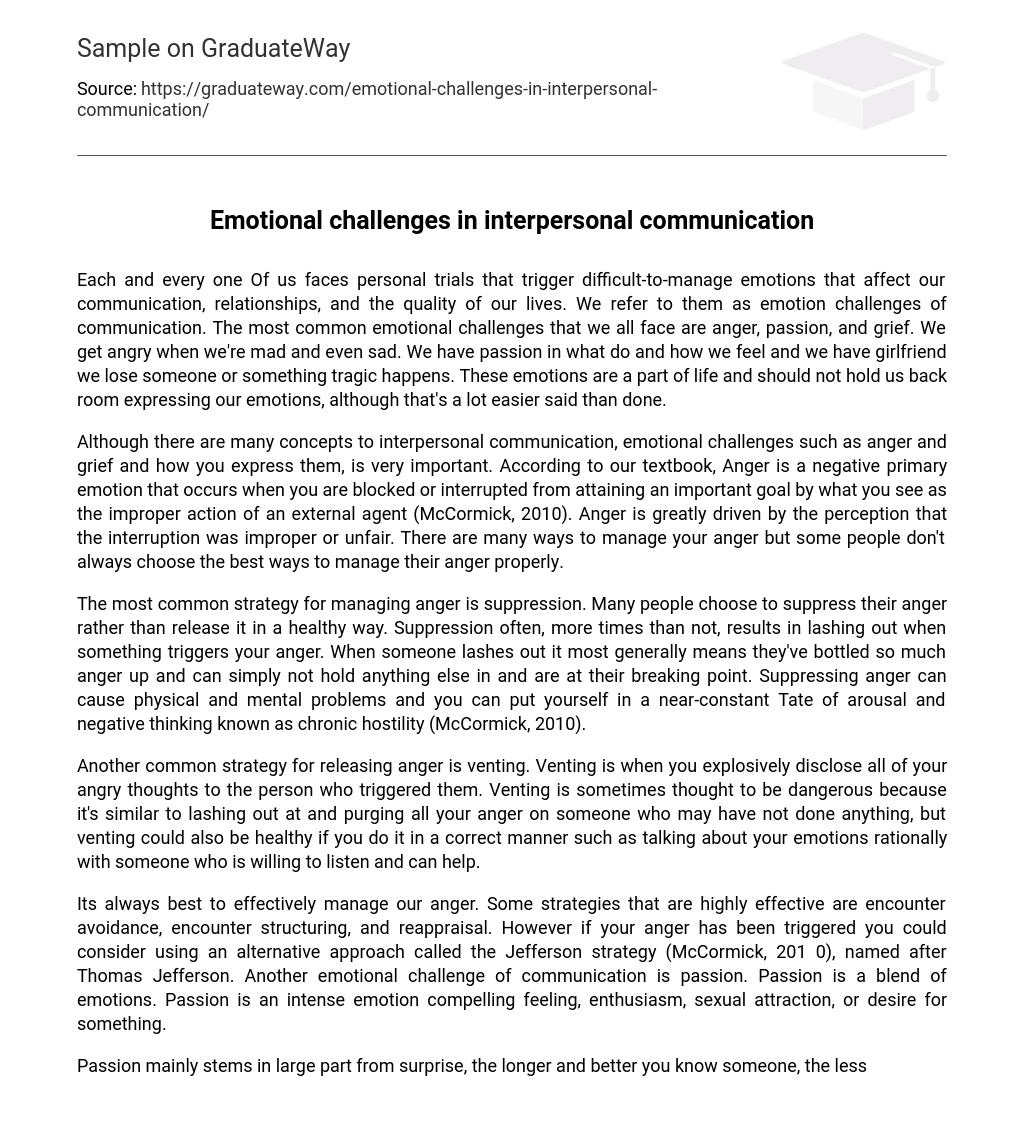Everyone faces personal difficulties that lead to difficult emotions, affecting communication, relationships, and overall well-being. The main emotional challenges consist of anger, passion, and grief. Anger stems from feelings of upset or sadness. Passion drives our actions and emotions. Grief arises when we lose a loved one or experience a tragic event. It is important to acknowledge these emotions as natural aspects of life that should not hinder their expression. However, putting this into practice proves challenging.
Interpersonal communication covers various concepts, with emotions such as anger and grief being highly significant. According to our textbook, anger is defined as a negative primary emotion that occurs when an external agent is believed to have obstructed or interrupted the achievement of an important goal (McCormick, 2010). The perception of unfair interruption plays a significant role in anger. Despite having multiple approaches to manage anger, not everyone consistently chooses the most effective methods.
The most common strategy for managing anger is suppression. Instead of releasing it in a healthy way, many people choose to suppress their anger. However, when anger is suppressed, it often leads to lashing out when triggered. This outburst usually indicates that the person has accumulated a great deal of bottled-up anger and has reached their breaking point. Suppressed anger can result in physical and mental issues and can create a constant state of arousal and negative thinking called chronic hostility (McCormick, 2010).
Another common strategy for releasing anger is venting. Venting involves explosively disclosing all of your angry thoughts to the person who triggered them. While some consider venting to be dangerous, as it may resemble lashing out and purging all your anger on someone possibly innocent, venting can also have a positive impact if executed appropriately. This includes discussing your emotions in a rational manner with someone who is willing to listen and provide assistance.
Managing anger effectively is always recommended. Some highly effective strategies include encounter avoidance, encounter structuring, and reappraisal. However, if your anger has already been triggered, you might want to consider using an alternative approach called the Jefferson strategy (McCormick, 2010), which is named after Thomas Jefferson. Another emotional challenge in communication is passion. Passion is a combination of intense emotions, including compelling feelings, enthusiasm, sexual attraction, or desire for something.
Passion primarily arises from surprise, and as we become more familiar with someone, our passion towards them diminishes. Passion is a result of what we perceive as unexpected. According to our textbook (McCormick, 2010), it is impossible to artificially create a passionate evening through meticulously planned dinners or romantic encounters. Our expectations of passion are influenced by the way it is portrayed in the media. Life can be challenging, but it is not solely the difficult moments that contribute to its struggles.
Keeping a happy and long-term romance requires work and communication. To maintain passion, it’s important to learn from mistakes and avoid dwelling on them. Additionally, always having a healthy escape ready and doing what you believe is right can help. One emotional challenge that is particularly difficult is grief, which everyone will face multiple times in their lives.
Grief is a complex response to loss, specifically the loss of a person or thing that had a meaningful connection. Although the terms are often treated as interchangeable, bereavement denotes the state of loss, while grief represents the response to that loss. The management of grief is a highly demanding and distinctive process (McCormick, 2010). When someone undergoes grief, they go through various stages. The first reaction is shock, followed by denial. Subsequently, there is an experience of despair and depression, leading to eventual recovery.
Crying is a normal and natural part of grieving, a unique emotional experience that cannot be overcome using emotion management strategies. Grief must run its course until eventual recovery from loss. A forever-effective way to manage grief is by emotionally sharing with others who have experienced or are experiencing similar pain, or with skilled individuals who can offer essential emotional support and comfort (McCormick, 2010).
Assisting someone in managing their grief can be done in different ways. One option is to join a support group and accompany them, but the most effective approach is through supportive communication. Supportive communication entails sharing messages that offer emotional support and personal assistance. However, it’s crucial to be mindful of the messages you convey to a grieving individual as some supportive messages may not be helpful. Emotions can be overwhelming for many people.
It can be problematic when we have a limited understanding of how to manage emotions because we often depend on familiar strategies. Emotions provide valuable insights and advantages that contribute to self-awareness and understanding our desires. They are also effective tools for communication and collaboration in our pursuit of significant accomplishments. However, resorting to unhealthy methods like expressing anger destructively or suppressing emotions entirely can have negative effects on our well-being, professional connections, and personal relationships.
The significance of expressing our emotions in a healthy manner is extremely high as it directly impacts our overall well-being and happiness. Suppressing our emotions can negatively affect all areas of our lives. Therefore, we should make the decision to recognize and express our emotions because holding them back requires a significant amount of energy and may result in more intense emotional encounters later on. By giving ourselves the freedom to openly express how we feel, we will undoubtedly experience greater benefits.
Expressing anger, passion, and grief is a common occurrence in our lives as these emotions are intense. It is important to possess the skill of effective communication in order to express them.





